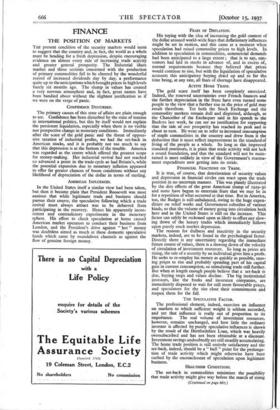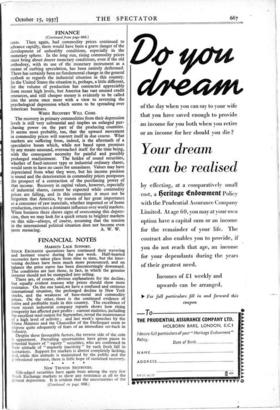FINANCE
THE POSITION OF MARKETS
THE present condition of the security markets would seem to suggest that the country and, in fact, the world as a whole must be heading for a fresh depression, despite encouraging evidence on almost every side of increasing trade activity and greater general prosperity. The Industrial share market and those sections concerned with the production of primary commodities fail to be cheered by the wonderful record of increased dividends day by day, a performance quite up to the anticipations which brought prices to high levels barely six months ago. The slump in values has created a very nervous atmosphere and, in fact, great names have been bandied about without the slightest justification as if we were on the verge of panic.
CONFIDENCE DISTURBED.
The primary causes of this state of affairs are plain enough to see. Confidence has been disturbed by the state of tension in international politics, but this by itself would not explain the persistent liquidation, especially when there is no visible nor prospective change in monetary conditions. Immediately after the scare of the gold panic and the threat of oppres- sive taxation of industrial profits, we had the set-back in American stocks, and it is probably not too much to say that this depression is at the bottom of the trouble. America was regarded as the centre which offered the greatest scope for money-making. Her industrial revival had not reached so advanced a point in the trade cycle as had Britain's, while the potential expansion due to monetary inflation appeared to offer far greater chances of boom conditions without any likelihood of depreciation of the dollar in terms of sterling.
AMERICAN INFLUENCES.
In the United States itself a similar view had been taken, but then it became plain that President Roosevelt was most anxious that while legitimate trade and business should pursue their course, the speculative following which a trade revival must always attract was to be debarred from participating in the recovery. Hence his apparently incon- sistent and contradictory experiments in the monetary sphere. His effort to check speculation at home caused American market operators to conduct their business from London, and the President's drive against " hot " money was doubtless aimed as much at these domestic speculative funds which came by roundabout channels as against the flow of genuine foreign money. FEARS OF DEFLATION.
His toying with the idea of increasing the gold content of the dollar aroused world-wide fears that deflationary influences might be set in motion, and this came at a moment when speculation had raised commodity prices to high levels. In addition to speculation in commodities, commercial demands had been anticipated to a large extent ; that is to say, con- sumers had laid in stocks in advance of, and in excess of, normal requirements because they believed that prices would continue to rise, but with the liquidation of speculative accounts this anticipatory buying dried up and so for the time being, at any rate, all fears of shortage have disappeared.
ACTIVE HOME TRADE.
The gold scare itself has been completely exorcized. Indeed, the renewed uncertainties over French finances and the further depreciation in the franc have even turned some people to the view that a further rise in the price of gold may result therefrom. Yet both the Stock Exchange and the commodity markets remain dull and dispirited, although, as the Chancellor of the Exchequer said in his speech to the Bankers last week, he can see no justification for supposing that the tide of our prosperity has reached its peak and -is about to turn. He went on to refer to increased consumption of staple commodities in the country and drew from it the deduction that it must reflect improvement in the standard of living of the people as a whole. So long as this improved standard continues, it is plain that trade activity will not lack a sound foundation, and that the standard will not be main- tained is most unlikely in view of the Government's rearma- ment expenditure now getting into its stride.
FINANCIAL REACTIONS ON TRADE.
It is true, of course, that deterioration of security values and depression in financial circles can react upon the trade position in no uncertain manner. This was plainly illustrated by the dire effects of the great American slump of 1929-30 and some have begun to entertain fears that we may be in for a repetition of what occurred at that time. But in America, too, the Budget is still unbalanced, owing to the huge expen- diture on relief works and Government subsidies of various- kinds, so that the volume of money going into circulation both here and in the United States is still on the increase. This factor can safely be reckoned upon as likely to offset any slow- ing down of the luxury trades which immediately follows upon purely stock market depression.
The reasons for dullness and inactivity in the security markets, indeed, are to be found in the psychological factor. Directly there is any uncertainty regarding the immediate future course of values, there is a slowing down of the velocity of circulation of investment resources. So long as prices are rising, the sale of a security by an individual gives him a profit. He seeks to re-employ his money as quickly as possible, caus- ing prices to rise and probably spending part of his capital gain in current consumption, so stimulating trade still further. But when at length enough people believe that a set-back is due, buying stops and values decline. The big institutional investors, like the banks and insurance companies, are immediately disposed to wait for still more favourable prices, and speculators for the rise close their commitments and reopen them for the fall.
THE SPECULATIVE FACTOR.
The professional element, indeed, exercises an influence on markets to which sufficient weight is seldom accorded, and yet that influence is really out of proportion to its importance. The real volume of investment resources, however, remains unchanged, and how little the ordinary investor is affected by purely speculative influences is shown by the result of the Hertfordshire Loan, which was heavily oversubscribed and has not been obtainable at a discount. Investment savings undoubtedly are still steadily accumulating. The home trade position is still entirely satisfactory and the set-back, indeed, should be a " bull" point for the prolonga- tion of trade activity which might otherwise have been curbed by the encroachment of speculation upon legitimate business.
HEALTHIER CONDITIONS.
The set-back in commodities minimises the possibility that trade activity might give way before the march of rising
(Continued on page 667.)
FINANCE
(Continued from page 666.) costs. Then again, had commodity prices continued to advance rapidly, there would have been a grave danger of the development of unhealthy conditions, especially in the monetary sphere. In the long run, rising commodity prices must bring about dearer monetary conditions, even if the old orthodoxy, with its use of the monetary instrument as a means of curbing speculation, has been entirely dethroned. There has certainly been no fundamental change in the general outlook as regards the industrial situation in this country. In the United States the situation is, perhaps, a little different, for the volume of production has contracted appreciably from recent high levels, but America has vast unused credit resources, and still cheaper money is evidently to be called into the arena once more with a view to reversing the psychological depression which seems to be spreading over American business.
WHEN RECOVERY WILL COME.
The recovery in primary commodities from their depression levels is still very substantial and implies an enlarged pur- chasing power on the part of the producing countries. It seems most probable, too, that the upward movement in commodity prices will reassert itself in due course. What markets are suffering from, indeed, is the aftermath of a speculative boom which, while not based upon premises by any means unsound, overreached itself for the time being, with the consequent necessity for painful and possibly prolonged readjustment. The holder of sound securities, whether of fixed-interest type or industrial ordinary shares, would seem to have no cause for uneasiness. Values may have depreciated from what they were, but his income position is sound and the deterioration in commodity prices postpones the prospect of a contraction of the purchasing power of that income. Recovery in capital values, however, especially of industrial shares, cannot be expected while commodity prices are falling, and in this connexion it must not be forgotten that America, by reason of her great importance as a consumer of raw materials, whether imported or of home production, exercises a dominant influence over world markets. When business there shows signs of overcoming this depres- sion, then we may look for a quick return to brighter markets on this side—always, of course, assuming that the tension in the international political situation does not become even























































 Previous page
Previous page